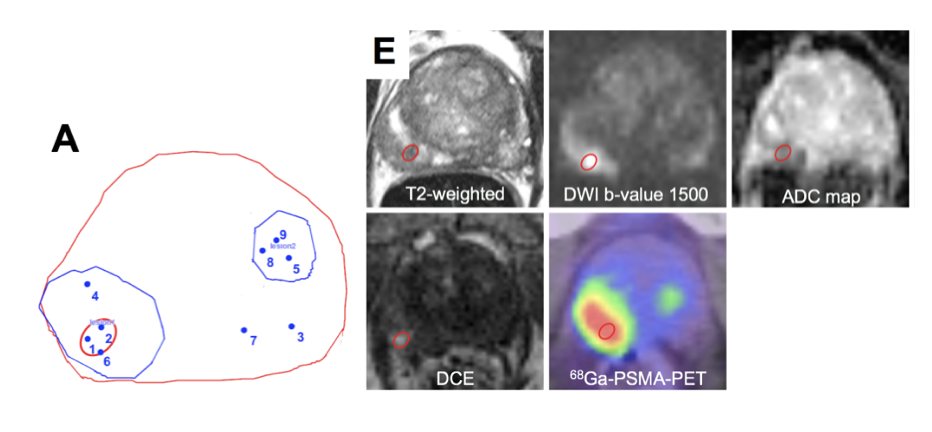For this pilot study, the authors enrolled five consecutive patients with suspicion for high-risk prostate cancer. Among these patients, 46 biopsy specimens were obtained and the CNA profiles were determined. All five patients underwent an mpMRI and 68Ga-PSMA-PET/CT followed by an MRI-transrectal ultrasound-fusion biopsy and subsequent radical prostatectomy. Analyses include CNA correlation to imaging features, in addition to performing radiogenomic analysis.
Among the 46 biopsy specimens analyzed, the authors found highly significant CNAs (>10 Mbp) in 22 specimens (47.8%). The most common CNA findings were losses of chromosome 8p, 13q and 5q. There was an excellent correlation between the index lesion defined by mpMRI and 68Ga-PSMA-PET/CT and the genomic index lesion defined by the highest number of CNAs:

Importantly, radiogenomic analysis suggests feasibility of developing radiologic signatures distinguishing between genomically more or less aggressive regions.
The strength of this study is the innovative findings demonstrating an ability to correlate two imaging techniques with genomic alterations at the tumor level. Certainly, these results require validation in larger and external cohorts. However, these findings support the notion seen in other preliminary data that 68Ga-PSMA-PET/CT can identify higher grade tumors based on SUV intensity: 3+3 – SUV 4.6; 3+4 – SUV 5.6; 4+3 – SUV 11.6; 4+4 – SUV 13.9; 4+5 – SUV 17.0 [1].
The authors are to be congratulated for their novel study. They concluded that imaging features of mpMRI and 68Ga-PSMA-PET/CT can act as a guide to the genomically most aggressive lesion of a prostate cancer. Furthermore, radiogenomics may help to better differentiate between indolent and aggressive diseases. This correlation of findings may be utilized in preoperative radical prostatectomy planning, as well as targeting appropriate lesions for patients considering focal therapy for localized prostate cancer.
Presented by: Armando Stabile, Vita-Salute San Raffaele University, Milan, Italy
Co-Authors: Jan P. Radtke, Heidelberg, Germany, Axel Wintsche, Leipzig, Germany, Manuel Wiesenfarth, Heidelberg, Germany, Mariska Luttje, Utrecht, Netherlands, Claudia Gasch, Svenja Dieffenbacher, Dogu Teber, Gencay Hatiboglu, Joanne Nyarangi-Dix, Tobias Simpfendörfer, Antonia Dimitrakopoulou-Strauß, Martin Freitag, Heidelberg, Germany, Anette Duensing, Pittsburgh, PA, Carsten Grüllich, Michael Götz, Dirk Jäger, Niels Grabe, Heidelberg, Germany, Michal R. Schweiger, Cologne, Germany, Frederik L. Giesel, Heidelberg, Germany, Wilfried Roth, Mainz, Germany, Sven Perner, Luebeck, Germany, Jörg Galle, Klaus Maier-Hein, Heidelberg, Germany, Boris A. Hadaschik, Essen, Germany, Heinz P. Schlemmer, Markus Hohenellner, David Bonekamp, Holger Sültmann, Stefan Duensing, Heidelberg, Germany
Written by: Zachary Klaassen, MD, Urologic Oncology Fellow, University of Toronto, Princess Margaret Cancer Centre, Twitter: @zklaassen_md, at the 2018 AUA Annual Meeting - May 18 - 21, 2018 – San Francisco, CA USA
References:
Koerber SA, Utzinger MT, Kratochwil C, et al. 68Ga-PSAM-11 PETCT in newly diagnosed carcinoma of the prostate: Correlation of Intraprostatic PSMA uptake with several clinical parameters. J Nucl Med 2017;58(12):1943-1948.


